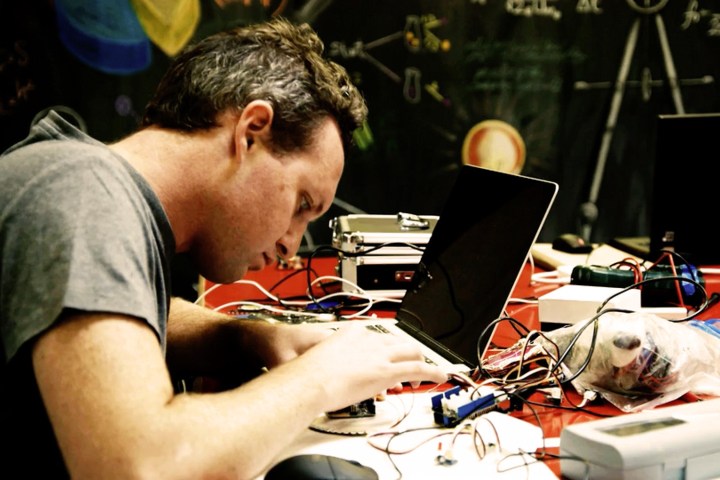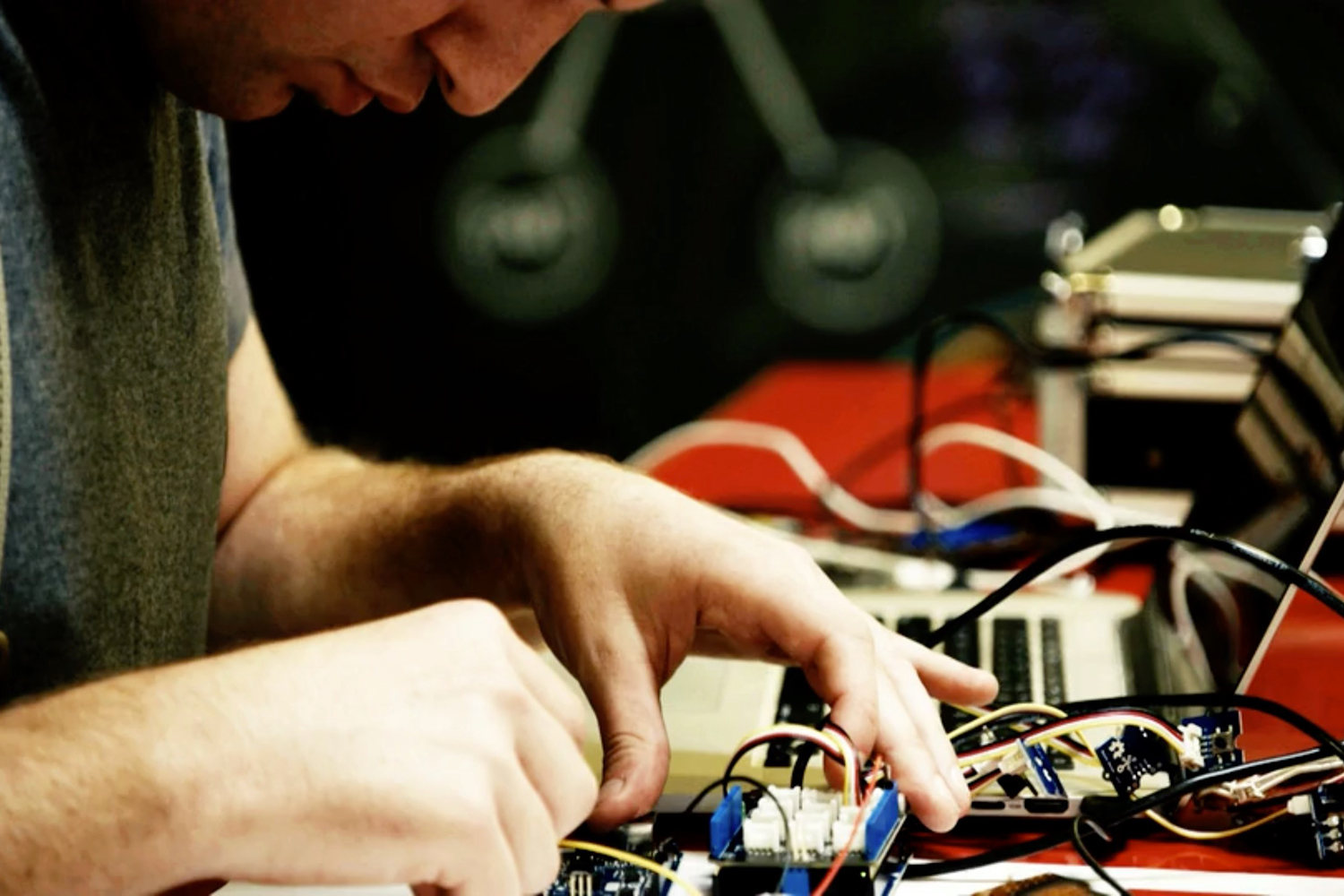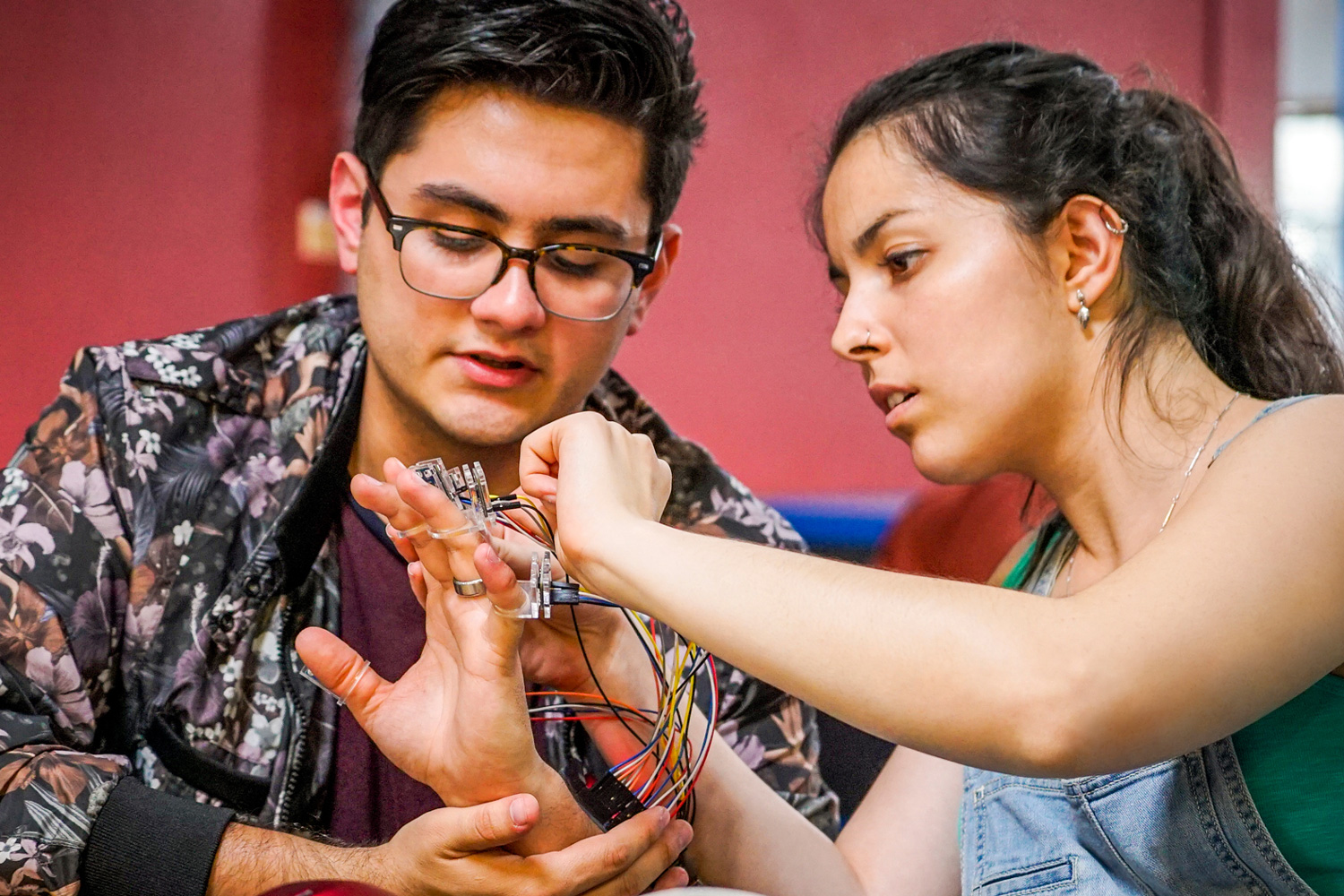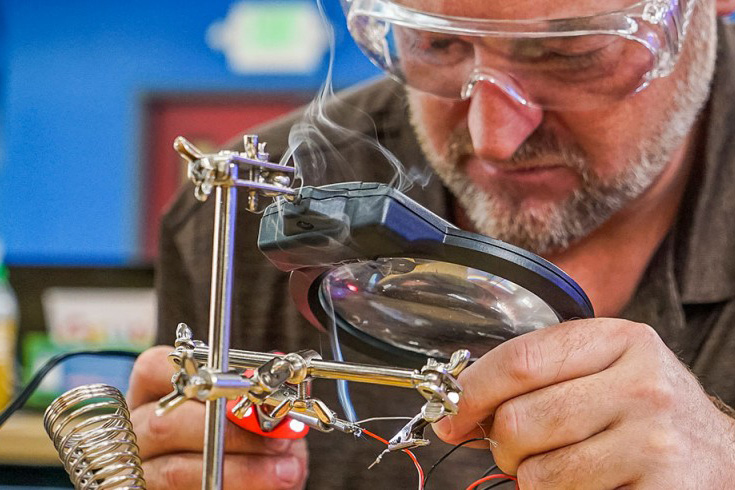
“So much is possible it’s mind blowing.”
The electronics and DIY renaissance that we call the “maker movement” has been gaining steam for the better part of the last decade, and next month, it’s finally getting it’s very own TV show. Starting on Tuesday, April 5, TBS will begin airing episodes of America’s Greatest Makers, a new reality TV competition from Intel where 24 teams of makers race to invent a game-changing tech product — all for a chance to capture the $1 million prize.
The show is basically like Shark Tank meets American Idol: Each team will present their technology to a panel of four pseudo-celebrity judges (one of whom is currently the CEO of Intel), who will then collectively decide whether or not the team’s device is worthy of proceeding to the next round. Each pitch is judged on creativity, innovation, marketability, presentation, and use of the Intel Curie module — a button-sized computer designed for use in wearable tech. Eventually, the pack will be whittled down to just five teams, who must duke it out for the top prize.
Seems pretty standard, right? We thought so too — until we got in touch with one of the contestants. To get a better sense of how the show will progress, Digital Trends got in touch with Zach Vorhies: a contestant on the show, and CEO of Zackees — a wearable tech startup that’s best known for its LED turn signal gloves. As we found out, there’s more to America’s Greatest Makers than meets the eye.
Digital Trends: So tell me a bit about how you got involved with this show. Did you send in an application or an audition tape or something?
Zach Vorhies: I actually got on the show because I was auditioning for Shark Tank when they had a casting call in San Francisco. The production company that does Shark Tank (Mark Burnett) was also doing this new show, America’s Greatest Makers. So I got a call from the one of the Shark Tank casting associates and they said, “We want to move forward with you for season 8.” But then a few weeks later, they called back and said that they wanted to know if I was interested in being featured for a new show about makers.
Once I heard that Intel was involved — well, that’s a company that has revolutionized computers, and it seemed a dream come true to be able be part of that. Also, I have a lot of admiration for Mark Burnett. His shows have spawned an entire wave of American entrepreneurship, so I knew that if Mark Burnett and Intel [were] behind this new show, it was something that I just couldn’t pass up.
I don’t know anyone who’s ever had a chance to make a product through a TV show. But here I was given that opportunity. I was beside myself. I saw a big button of “YES,” and I hit it as hard as I could.
Wait a second. That last part — the whole “having a chance to make a product through a TV show” thing. Is that how it works? Is it like an incubator program where they provide you with resources and guidance, or are you just totally on your own?
It’s very much like an incubator experience. The show collaborated with the Berkeley School of Haas to give us a crash course in business. It was a very intense work session with classes nearly every day.
Interesting. Was there much help and guidance on the technological front? Or did they mostly focus on business?
“Presenting my creations to the judges was absolutely terrifying. I think Shark Tank would have been easier.”
And you had never worked with Curie before?
Never.
What were you prototyping with before? Arduino? Raspberry Pi? Something else?
I’ve been a big fan of Arduino. Arduino has been so inspirational that it actually made me change my career in software — working for Google — to pursue a career in hardware. The clever thing that Intel did here was that their Intel Curie module has been designed to be compatible with Arduino code. For example, the Arduino 101 by Intel is the Intel Curie module in Arduino UNO form factor.
Can you tell me a bit more about what it was like to be on the show, presenting your creations to the judges? Had you ever done anything like that before?
Presenting my creations to the judges was absolutely terrifying and incredible. I think that Shark Tank would have actually been easier, because at least in Shark Tank you’re only competing against yourself. In this show I was competing against some of the best makers in America. It was the hardest thing I’ve ever done and it humbled me.
So the show is over but you still don’t know who won, correct?
Filming has concluded. The actual outcome of the show is amazing, but I can’t say more. You’ll have to watch to find out what happens.
Well how about this then — if you turned out to be the winner, what would you do with the $1 million?
$1M will go directly into building the product and putting the product out in front of the customer.
Is that your choice, or is that just how all this works? Is this basically just a televised incubator program from Intel, where they’ll give $1,000,000 in funding to the most promising prospect?
Essentially yes. It’s taking the process of creating value for the customer with some of the best makers in the world and making a TV show out of it. And it’s really going to be inspiring to the new generation of makers. It helps the viewer ask themselves “Why not?” instead of “That’s impossible and I could never do that.” So much is becoming possible now. These microprocessors are basically magic in a small little chip the size of fingernail.
And they’re cheap as hell these days too.
It’s mind blowing how cheap they are and how easy they are to program. Five years ago it was nearly impossible for an amateur to make smart product on their own — now you have kids making things like cat doors that open up when their house cat comes within proximity. It begs the question of “What happens in the next five years?” So much is possible it’s mind blowing.







